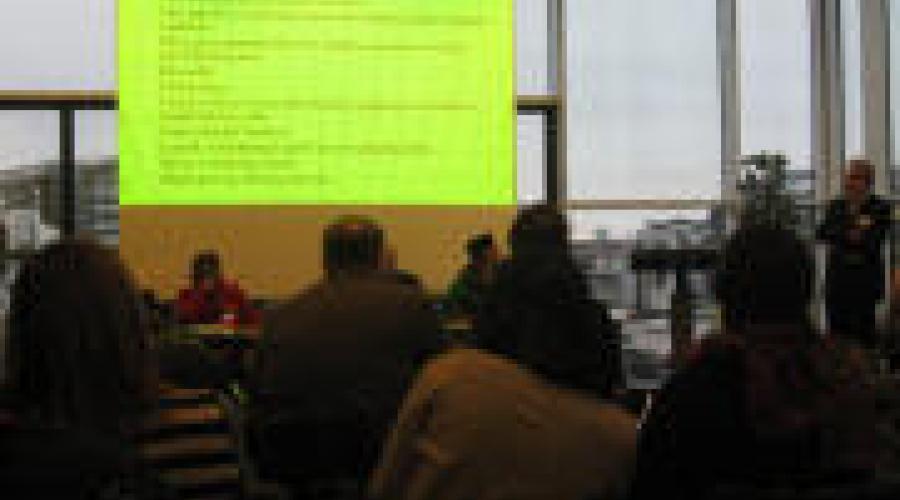
Sarah Edelson, BSILR'10 and Thomas van Haaren, MILR'10 experience the UN Climate Change Conference in Copenhagen "up close and personal"
Sarah Edelson's Copenhagen Experience:
This winter I had the very fortunate opportunity to travel to Copenhagen, Denmark to attend the beginning of the second week of the UN Climate Change Conference, COP 15. Over the course of my time there I attended official conference presentations at the Bella Center, side-labor discussions events at the LO Denmark building, and an independent NGO forum event, Klimaforum. I had a great chance to explore different areas of the city as I made my way between events.
At the Bella Center I observed official UNFCCC proceedings, and I gained a unique perspective on the organizational and procedural challenges that the international community faced in terms of accommodating the large number of conference participants. During the evenings of the second week of the conference protests frequently took place outside of the building, and it was very interesting to have the chance to meet and interact with participants taking place in these activities.
As the second week of the conference wore on, the UNFCCC started to limit access of registered NGO participants to the official Bella Center itself. However, the International Trade Union Confederation (ITUC), in partnership with LO-Denmark, organized a 3-day side-program to supplement the official conference activities, which provided a much welcome alternative to waiting in entrance line at the Bella center. At these labor events I was able to attend meetings and discussions regarding very specific areas of labor union involvement in the transition to climate-conscious policy. Labor delegates from around the world gathered at these events and it was fascinating to hear the unique perspective and ideas each person brought to the table.
On my last day in Copenhagen, I had the opportunity to attend Klimaforum, another side-event organized by a conglomeration of NGOs, whereupon I attended a series of discussions and presentations motivated by a more radical standpoint. It was extremely interesting to hear yet another perspective on the issues of climate change and government response, as well as a different community’s perspective on how to enact lasting and meaningful change to meet the challenge.
I am extremely thankful that I had the opportunity to travel to Denmark and to engage in each of these meaningful events surrounding the pivotal UNFCCC COP 15. In a short period of time I was able to learn and gain an incredible amount of information about the challenges and unique opportunities presented by this global phenomenon, and I look forward to continuing to engage in research in this area in the months to come.
Thomas van Haaren's Copenhagen Experience:
This past winter break I had the privilege of attending the UN Climate Change Conference in Copenhagen. I took an interest in the work of labor unions and climate change after taking a class taught by Sean Sweeney of Cornell’s Global Labor Institute. Also known as COP15, the conference represented the 15th conference of the parties following the groundbreaking UN Framework Convention on Climate Change. Arriving for the second part of the two week conference, many believed the Copenhagen conference had the potential to produce a groundbreaking climate change treaty to replace the expiring Kyoto Protocol.
As part of Cornell’s larger delegation, the UN granted non-governmental origination observer status to members of the GLI’s delegation. This status granted us access to the Bella Centre where the primary consultations and discussions took place. Despite our best attempts to sit in on a negotiation session between government officials, international drama unfolded before our eyes as representatives of the developing world walked out of the conference in protest. In addition, demonstrations that I witnessed firsthand upon arrival turned increasingly violent as the proceedings appeared to be failing.
All of this lay in stark contrast to the enormous generosity and openness that the citizens of Denmark provided for the people from around the world that gathered in their city. Copenhagen itself lies at the mouth of a large harbor and the people were well aware of the impact climate change could have on their way of life. The city itself is a model of green living with many of the Danish taking to the streets on their bicycles in all forms of weather. Bike lanes as wide as car lanes and special seats for bikers on the metro ensure that Copenhagen is one of the most green cities in all of Europe, if not the world. Trade unionists, city planners, and environmentalists stand to gain much insight into how to transform an established city into a carbon neutral metropolis.
Not too far from the Bella Centre, two side events to the main negotiations took place involving the union-sponsored, World of Work (WoW) conference and the NGO-sponsored, Klimaforum '09. WoW brought together unions from around the world to engage in frank discussions about how climate change policies might affect the lives of workers in developed and developing nations.
Topics included agriculture, energy, transportation and the concept of a "just transition"- the idea that no individual should lose their way of life as a result of climate protection policies. For more on just transition, see this blog entry from Copenhagen at: http://www.ilr.cornell.edu/news/121409_Copenhagen.html.
Overall, the experience in Copenhagen illustrated the diverse number of people who want their voices heard in the global climate debate. Although the governmental delegates did not reach any substantial climate protection policy, the connections made between concerned citizens around the world will help.


